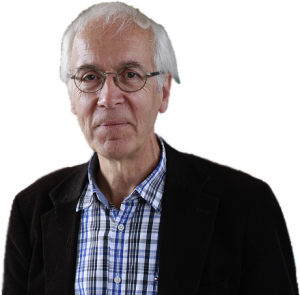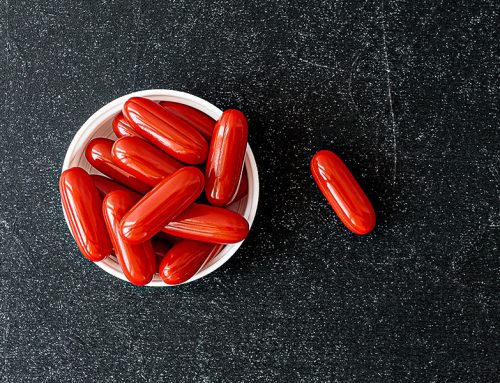
Dr. Urban Alehagen, professor emeritus, Linköping University in Sweden, is the lead researcher on the KiSel-10 study of the effects of combined Coenzyme Q10 and selenium supplementation on the heart health of senior citizens. Senior citizens who took CoQ10 and high-selenium yeast supplements for four years had significantly better heart function and significantly reduced heart mortality compared to senior citizens who took matching placebos. One possible explanation is that there was significantly less fibrogenic activity in the treatment group than in the placebo group and that the reduced levels of fibrosis are related to the improved heart function and reduced cardiovascular mortality in the treatment group.
Daily supplementation with the ubiquinone form of Coenzyme Q10 and selenium-enriched yeast has significant health benefits for senior citizens:
- The combination of the two supplements reduces the levels of bio-markers for fibrosis in senior citizens [Alehagen 2018].
- The combination of the two supplements improves cardiovascular function and reduces the risk of cardiovascular mortality [Alehagen 2013].
- The combination of the two supplements provides a means of correcting a dietary shortage to which senior citizens may be subject [Hargreaves & Mantle].
Fibrosis and the Ageing Process
Fibrosis is the bio-medical term for the formation of fibrous connective tissue, much of which is collagen.
- Fibrosis is a normal process for wound healing and tissue repair.
- In senior citizens, there is a greater risk of uncontrolled continuation of the formation of fibrous connective tissue, resulting in tissue scarring and loss of function in organs such as the heart, lungs, liver, and kidneys [Hargreaves & Mantle].
- Progressive fibrosis and loss of function in vital organs is a known symptom of ageing [Hargreaves & Mantle].
- Organ fibrosis has been estimated to be a factor in up to 50% of all-cause human deaths [Hargreaves & Mantle].
- Effective treatments for fibrosis in senior citizens are not available at present [Hargreaves & Mantle].
Coenzyme Q10 and Senior Citizens
Coenzyme Q10 has important biological roles in humans:
- Coenzyme Q10 is an essential co-factor in the cellular process of ATP energy generation [Belardinelli].
- Coenzyme Q10 is an important fat-soluble antioxidant, neutralizing the harmful effects of free radicals in lipid environments and reducing the extent of oxidative stress [Belardinelli].
- Coenzyme Q10 has a beneficial effect on the endothelial cells that regulate the contraction and relaxation of the blood vessels and regulate such processes as blood clotting, immune function, and platelet adhesion [Belardinelli].
- Coenzyme Q10 reduces the blood levels of bio-markers for inflammation, indicating that Coenzyme Q10 may have anti-inflammatory properties [Hargreaves & Mantle].
Decreasing CoQ10 Bio-Synthesis with Increasing Age
The major source of Coenzyme Q10 in humans is the endogenous bio-synthesis of the substance.
- Once we humans reach our 20s, most of us begin to synthesize less Coenzyme Q10 as we get older [Hargreaves & Mantle].
- It is impossible to make up the ageing-related loss of bio-synthesized Coenzyme Q10 by eating more food or by eating more wisely [Hargreaves & Mantle].
- Daily supplementation is necessary [Hargreaves & Mantle].
- Not all CoQ10 supplements are equally well formulated. The formulation of the CoQ10 supplement plays a vital role in CoQ10 absorption and bio-availability [Lopez-Lluch].
Cardiovascular Fibrosis and Senior Citizens
Post-mortem analysis has revealed that, in the normal ageing process, the collagen content providing structural support for heart muscle’s contractile cells increases approximately 50% from the third decade to the seventh decade of life [Hargreaves & Mantle].
- The extra collagen stiffens the heart muscle so that heart muscle contractility and relaxation are impaired, which ultimately leads to a diagnosis of heart failure [Hargreaves & Mantle].
- In cases of heart attack, heart muscle cells die, leading in turn to the production of excess collagen and to a stiffening of the heart muscle [Hargreaves & Mantle].
The Protective Effect of Combined Coenzyme Q10 and Selenium Supplementation
In the KiSel-10 Study, Professor Urban Alehagen and a team of researchers from Linköping University in Sweden treated senior citizens (average age: 78 years) living at home with either a daily combination of Coenzyme Q10 and high-selenium yeast or matching placebos for four years.
- The active treatment in the KiSel-10 Study consisted of 2 times 100 milligrams of the ubiquinone form of Coenzyme Q10 combined with 200 micrograms of a patented high-selenium yeast preparation [Alehagen 2013].
- The senior citizens who took the active Coenzyme Q10 and selenized yeast treatment in the KiSel-10 Study had significantly reduced cardiovascular mortality, improved heart function as seen in echocardiography, and improved health-related quality of life [Alehagen 2013].
- Follow-up analyses of the KiSel-10 Study senior citizens showed reduced cardiovascular mortality 12 years after the supplementation with selenium and Coenzyme Q10 for four years [Alehagen 2018].
- A 2018 report from the KiSel-10 researchers identified significant reductions in a range of bio-markers for fibrosis. The researchers suggested that a possible mechanism for the improvement in heart function and reduction in death from heart disease might be the reduction in cardiac fibrosis [Alehagen 2018].
Not All CoQ10 Supplements are Equally Well Absorbed
A 2019 study with a double-blind crossover design showed that the formulation of the CoQ10 supplement is more important for absorption and bio-availability than the form of the CoQ10 supplement is [Lopez-Lluch].
Coenzyme Q10 molecules are redox molecules. They have an oxidized form called ubiquinone and a reduced form called ubiquinol. The ubiquinone form is an electron acceptor and is essential to the cellular process of ATP energy production. The ubiquinol form is an electron donor and is an important fat-soluble antioxidant protecting cells and DNA and lipoproteins against oxidative damage [Belardinelli].
The double-blind crossover study showed that a well-formulated ubiquinone CoQ10 supplement gave a significantly better bio-availability than a well-formulated ubiquinol supplement. Both the ubiquinone CoQ10 supplement and the ubiquinol supplement gave significantly better bio-availability than five other differently formulated ubiquinone CoQ10 supplements [Lopez-Lluch].
The specific composition of the carrier oils and the special heating/cooling process in the manufacture of the best-absorbed ubiquinone CoQ10 distinguish it from other forms and formulations available commercially [Lopez-Lluch].
The best absorbed ubiquinone CoQ10 supplement used in the comparative bio-availability study is the same formulation that was used in the KiSel-10 Study discussed above and used in the Q-Symbio Study of the effect of CoQ10 adjunctive treatment of chronic heart patients [Mortensen 2014; Mortensen 2019].

Dr. Svend Aage Mortensen, Copenhagen University Hospital, was the lead researcher on the Q-Symbio Study of the effect of adjunctive treatment of chronic heart failure patients with 300 milligrams of Coenzyme Q10 daily for two years. The CoQ10 adjunctive treatment resulted in significantly improved symptoms compared to placebo treatment.
The Q-Symbio Study of Adjunctive Treatment of Chronic Heart Failure Patients with Coenzyme Q10
In the Q-Symbio Study, researchers randomly assigned chronic heart failure patients to take 3 times 100 milligrams of ubiquinone Coenzyme Q10 or placebos in addition to the conventional heart medication for two years. The study data showed the following significant health outcomes [Mortensen 2014]:
- reduced cardiovascular mortality
- reduced all-cause mortality
- reduced incidence of major cardiovascular adverse events
- reduced need for heart failure related hospitalization or re-hospitalization
An analysis of the data from the European segment of the international Q-Symbio Study also showed that the CoQ10 adjunctive treatmentwas associated with significantly improved ejection fraction [Mortensen 2019].
Summing Up: Coenzyme Q10 and Selenium Supplementation
- The combined CoQ10 and selenium yeast supplementation provided significant heart health benefits to senior citizens.
- Supplementation with Coenzyme Q10 conferred significant heart health benefits in patients with chronic heart failure.
- In both studies, the effect of Coenzyme Q10 supplementation on the process of fibrosis may have been an important factor. Fibrosis is exacerbated in elderly individuals [Hargreaves & Mantle].
CoQ10 supplements differ so much in absorption and efficacy that it is wisest to choose a CoQ10 supplement with documented absorption and bio-availability and health effects.
Read our key article about CoQ10 and cardiovascular health in elderly people
Sources
Alehagen, U., Johansson, P., Björnstedt, M., Rosén, A., & Dahlström, U. (2013). Cardiovascular mortality and N-terminal-proBNP reduced after combined selenium and Coenzyme Q10 supplementation: a 5-year prospective randomized double-blind placebo-controlled trial among elderly Swedish citizens. International Journal of Cardiology, 167(5), 1860-1866.
Alehagen, U., Aaseth, J., Alexander, J., & Johansson, P. (2018). Still reduced cardiovascular mortality 12 years after supplementation with selenium and coenzyme Q10 for four years: A validation of previous 10-year follow-up results of a prospective randomized double-blind placebo-controlled trial in elderly. Plos One, 13(4), e0193120.
Alehagen, U, Aaseth, J, Alexander, J, Svensson, E, Johansson, P, & Larsson A. (2018). Less fibrosis in elderly subjects supplemented with selenium and coenzyme Q10-A mechanism behind reduced cardiovascular mortality? Biofactors, 44(2):137-147.
Belardinelli, R, Tiano, L, & Littarru, GP. (2008). Oxidative stress, endothelial function and coenzyme Q10. Biofactors; 32(1-4):129-33.
Hargreaves, IP & Mantle, D. (2019). Coenzyme Q10 supplementation in fibrosis and aging. Adv Exp Med Biol, 1178:103-112.
López-Lluch, G., Del Pozo-Cruz, J., Sánchez-Cuesta, A., Cortés-Rodríguez, A. B., & Navas, P. (2019). Bioavailability of coenzyme Q10 supplements depends on carrier lipids and solubilization. Nutrition, 57, 133–140.
Mohr, D., Bowry, V. W., & Stocker, R. (1992). Dietary supplementation with Coenzyme Q10 results in increased levels of ubiquinol-10 within circulating lipoproteins and increased resistance of human low-density lipoprotein to the initiation of lipid peroxidation. Biochimica et Biophysica Acta, 1126(3), 247-254.
Mortensen, S. A., Rosenfeldt, F., Kumar, A., Dolliner, P., Filipiak, K. J., Pella, D., & Littarru, G. P. (2014). The effect of coenzyme Q10 on morbidity and mortality in chronic heart failure: results from Q-SYMBIO: a randomized double-blind trial. JACC. Heart Failure, 2(6), 641-649.
Mortensen, A. L., Rosenfeldt, F., & Filipiak, K. J. (2019). Effect of Coenzyme Q10 in Europeans with chronic heart failure: A sub-group analysis of the Q-Symbio randomized double-blind study. Cardiology Journal, 26(2): 147-156.
The information in this review article is not intended as medical advice and should not be used as such.









Leave A Comment